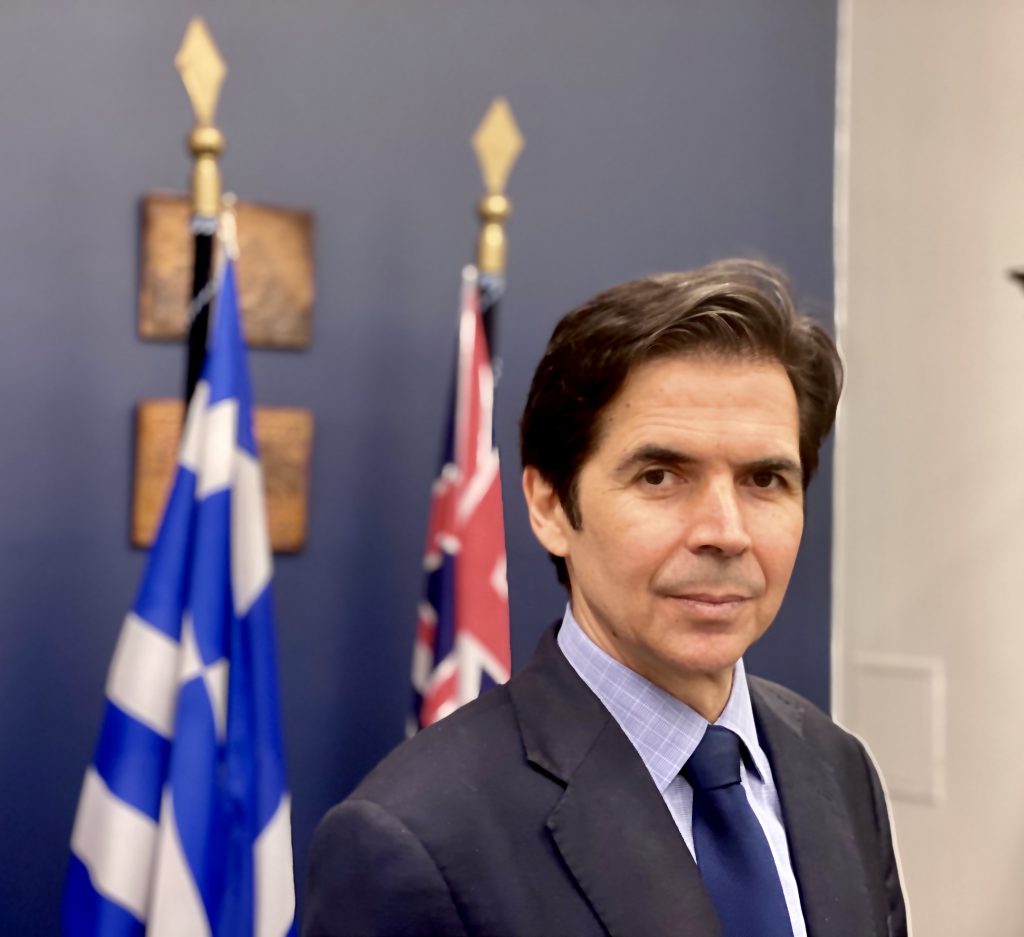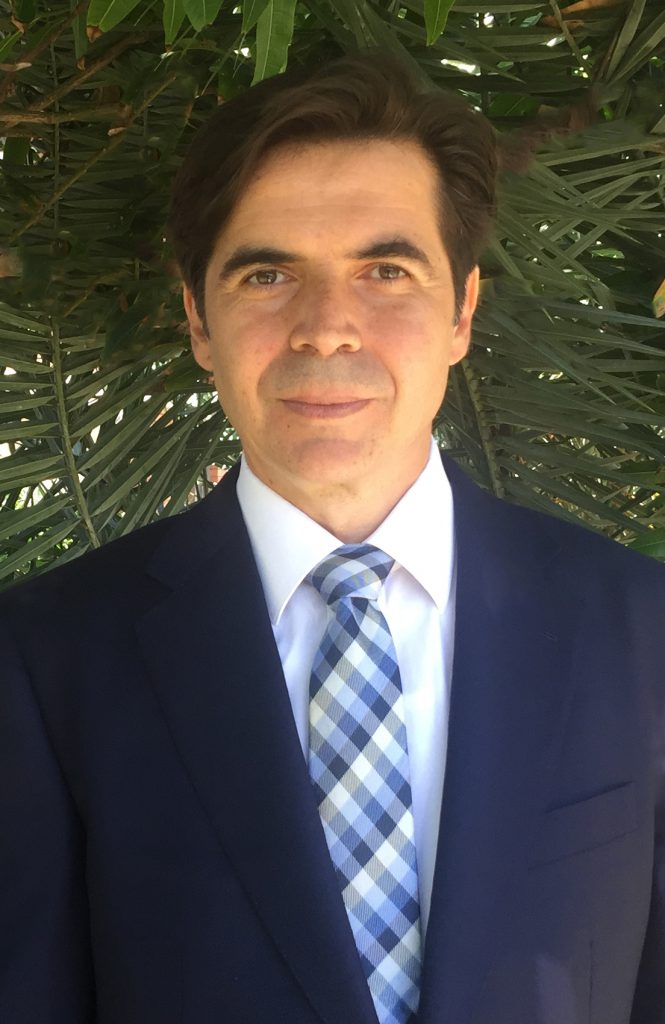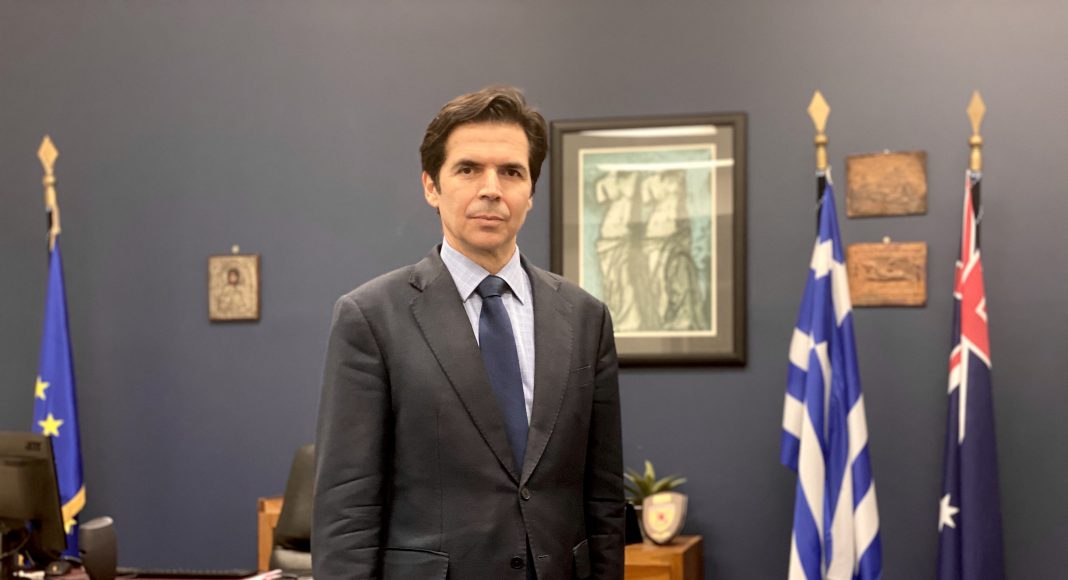By Ilias Karagiannis
The Consul General of Greece in Sydney is a role that comes with great responsibility and leadership. The role also requires the ability to effectively communicate and manage a wide range of often complex social and commercial interactions between Greece and the local expatriate community.
Mr Christos Karras assumed his duties as Consul General of Greece in Sydney in December 2017. Since then, he has been a vehement symbol of the appreciation that Greece has for the Greeks of Australia.
Ilias Karagiannis from The Greek Herald sat down with Mr Karras to discuss how the COVID-19 pandemic has impacted Consulate’s ability to perform its duties, his impressions of Australia during his time in office and his ambitions for the future.
The COVID-19 pandemic is still in its infancy. Although the measures seem to be working in both Australia and Greece, vigilance is needed. How did you experience the pandemic outbreak at the Consulate General and what were the biggest challenges?
The main challenge we faced due to the coronavirus pandemic was to ensure the smooth running of the Consulate General, while at the same time taking measures to safeguard public health and that of our staff. Therefore, in order to safeguard public health and following the relevant instructions of the Greek Ministry of Foreign Affairs, the Consulate General immediately made a temporary adjustment of its mode of operation, handling only urgent and absolutely necessary consular matters, by appointment. At the same time, we immediately implemented the necessary precautionary hygiene measures in our transactions with the public, in compliance with the instructions given by the competent Australian Authorities and the Greek Ministry of Foreign Affairs.
In addition, throughout the crisis, we have been closely monitoring developments and measures to address the pandemic in New South Wales and we have been updating, on a daily basis, the information we provide to those interested by phone and email, by posting relevant announcements on our website, and by updating our social media. In order to keep up to date and be fully effective, we are, of course, in close coordination with the Embassy of Greece and the other Consular Authorities of our country in Australia, but also with the Consular Authorities of the Member States of the European Union in Sydney.
Were there cases of Greeks who were called to intervene to be repatriated? What are the most common requests arriving at the Consulate these days?
Our priority throughout this crisis has been to be of assistance, by promptly providing valid information and issuing relevant documents, to all Greek citizens left stranded in New South Wales, who have expressed to the Consulate General the desire to be repatriated to Greece, many of them being visitors whose return flights had been cancelled due to pandemic. To this end, the Consulate General has recorded the names of those Greek citizens on a special list and has kept the Greek Ministry of Foreign Affairs informed, in coordination with the Embassy of Greece. The Consulate General is also in constant communication and cooperation with the Holy Archdiocese of Australia, which, it is worth noting, helped several of our compatriots return to Greece and expressed its readiness to provide assistance in any way possible. The Consulate General is also in contact with associations of the Greek community in Sydney.
In particular, the Consulate General has provided information, among other things, on the available commercial flights to Greece, on the measures being enforced in Greece (including the mandatory quarantine for 14 days passengers arriving in Greece), as well as on the process of temporary residence permits renewal in Australia, organised by the Australian authorities. The Consulate General also provided dual (Greek and Australian) citizens who did not have a Greek passport, with certificates of Greek citizenship or temporary travel documents for their smooth return to Greece and informed them of the procedure to take permission by the Australian Authorities to leave Australia.
As for Australian citizens, the Consulate General provided, during the crisis, information on the imposition of a temporary ban on entry into Greece of third-country nationals other than EU member states and Schengen Area countries, as well as on exceptions from that ban.
In addition to the above, other urgent cases that the Consulate General continued to serve concerned, in particular, the provision of power of attorney and information pertaining to national service affairs.

What are the most common requests that are made to the Consulate General under normal circumstances?
Under normal circumstances, the Consulate General in Sydney is usually required to issue visas to Greece, to facilitate expatriates to exercise their right to acquire Greek citizenship, to provide Greek citizens with Greek passports, to provide power of attorney, to register births, marriages and deaths, to provide information and documents pertaining to national service affairs and to certify the authenticity of documents.
Much of Greece’s GDP comes from tourism. This year the tourism seems almost lost. Australia and its Greeks contribute to this. Do you think that this stable connection with the motherland will be restored? Do you think it is necessary to have some campaigns for Greece and tourism in Australia?
Indeed, the tourism sector is very important for the Greek economy, as a large part of our country’s GDP comes from it. From 2012 onwards, Greece has reached record numbers of arrivals every year and from 2017 onwards, the annual arrivals consistently have exceeded 30 million. In 2019 we had a new record number of arrivals, as international visitors exceeded 34 million, while arrivals from Australia also set a new record and reached 338,600 people. The total tourism revenue in 2019 amounted to 18.2 billion euros, while revenues from Australian tourists amounted to 371 million euros.
As you mentioned, part of the revenue for 2020 has already been lost, due to the travel restrictions imposed internationally to deal with the coronavirus pandemic. Exactly when the flow of tourism from Australia to Greece will be restored will depend on the developments regarding the pandemic, which in turn will determine both the decisions made by the Australian government regarding the international travel of Australian citizens, and the decisions of the Greek government.
Regarding the promotion of tourism in Greece in the meantime, a very successful campaign for Greek tourism is already underway, titled Greece From Home, which has attracted lots of attention and has received enthusiastic reviews from abroad. This campaign aims to promote the image of Greece and the tourism opportunities Greece offers, in order to encourage third-country nationals to visit our country as soon as the travel restrictions are lifted.
From the point of view of the Consulate General, we are always ready to work with local agencies to organise promotion activities when conditions in Australia allow it, as we have often done in the past.

In December you will complete three years in the post of Consul General of Greece in Australia. Tell us the impressions you formed from the community and the Greeks of Australia?
My impressions of the Greek community in Australia and, in particular, of New South Wales are excellent. The Greek-Australians have managed, through their hard work, perseverance and ingenuity, to consolidate their position in a distant, new but hospitable environment. At the same time, they have contributed, like few other peoples, to building their new homeland. The successful integration of the Greek community into the Australian society has contributed to both the strengthening of Australia’s multicultural character and the creation, maintenance and further strengthening of cordial relations between Greece and Australia.
The presence of Greek-Australians is strong in the fields of politics (both at the federal and state levels), the economy and culture. Hundreds of Greek community associations produce great social, educational and cultural work, which includes, among other things: the organisation of Greek festivals and Greek cinema festivals; the provision of scholarships to Greek-Australian students and scientists, and Greek artists; the arrival of members of the Presidential Guard in Australia to participate in ANZAC Day or the Greek Independence Day celebrations; and the organisation of annual events to celebrate the Anniversary of the Battle of Crete and the Greek Campaign. It is no coincidence that the Hellenic Lyceum Sydney, the first subsidiary of “The Lykeion ton Hellenidon” (“The Lyceum Club of Greek Women”) outside Greece was founded here in Sydney in 1951.
Sydney is also, of course, the seat of the Holy Archdiocese of Australia, which carries out activities not only purely religious, but also social, educational and cultural, e.g. through its bilingual colleges and afternoon schools, as well St Andrew’s Theological College.
The Greek community has managed to combine its successful integration into the multicultural Australian society with the preservation of Greek identity, the Greek way of life and Greek culture. This fact is evident in the Greek-Australians’ level of knowledge of the Greek language and their close contact, even within the younger generations, with our country (which they often visit), our customs and our traditions.
Modern Greek studies at a university level, as well as the Greek newspapers and radio programs in Greek, have also made a significant contribution to the preservation of the Greek language and culture in New South Wales, e. g. at the Department of Modern Greek and Byzantine Studies at the University of Sydney, or within the framework of the Program of Modern Greek Studies at Macquarie University.
Looking at your resume and previous interviews, I was impressed by your degree in literature. Albert Camus’s “The Plague” is a classic read that these days captures in a piece what we live. Mr. Proxenes, do you think that literature has taught us lessons during the pandemic?
The subject of plagues has attracted many writers and has been a source of inspiration, as a background or as a major theme, for important works of European literature. From Boccaccio’s “The Decameron” to Jose Saramago’s “Blindness”, each author offers their own perspective and different stimuli to the reader. In Greek literature, I think Alexandros Papadiamantis’ short story “Vardianos sta Sporka” stands out, but it would be an omission not to mention the History of the Peloponnesian War, as Thucydides’ description of the plague that struck Athens is one of its most fascinating passages.
To confine myself to Albert Camus’ “The Plague” that you mentioned, one of the most important novels of the 20th century, whose protagonist is a doctor, in the same way as the protagonists of the current crisis are doctors, nurses and other healthcare professionals, the pandemic teaches us how we can give meaning to our lives by choosing love and kindness, empathy and generosity towards fellow human beings. Plagues and wars always find people unprepared, says Camus, who implies that even if we can’t eliminate all instances of evil and suffering that plague humanity, we can at least try to reduce them with small, everyday acts of heroism.
Personal ambitions after about 3 years in Sydney? You will want to stay here or take the next step?
According to the statutes of the Ministry of Foreign Affairs, there are time limits to our posting to the various Greek Missions abroad, therefore, depending on the needs of the Ministry, I will inevitably have to leave Sydney at some stage. In fact, taking into consideration that I came to Sydney directly after Moscow where I served at our Embassy and given that after two consecutive postings abroad we have to return to the Ministry of Foreign Affairs in Athens, I know for certain that after my departure I will return to Greece.
As for my personal ambitions, I would like, as any other Greek diplomat would, to serve at other equally interesting Greek missions abroad and, of course, to advance up the hierarchy within the Ministry of Foreign Affairs. After Athens, I have some preferences for the future, but I would say that the unanticipated also has its own charm. In any case, I consider it a privilege and a great honour to have been given the opportunity to serve as Consul General of Greece in Sydney.

